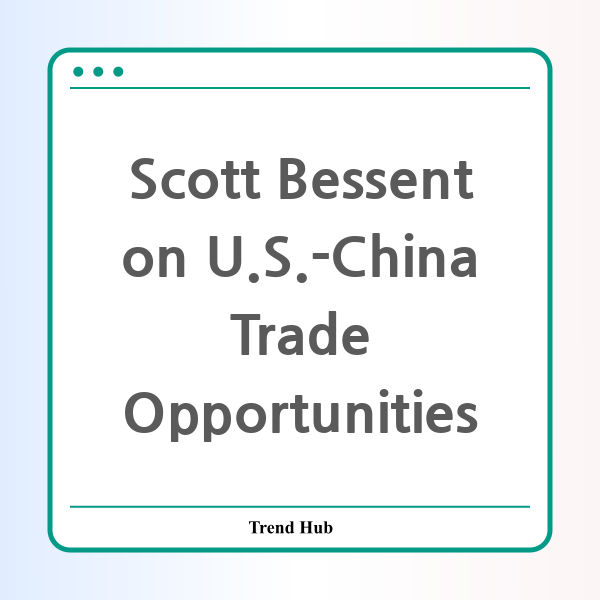* This website participates in the Amazon Affiliate Program and earns from qualifying purchases.

As the global economy continues to navigate uncharted waters, U.S. Treasury Secretary Scott Bessent has emerged as a pivotal figure in discussions surrounding U.S.-China trade relations. During a recent address to the Institute of International Trade and Finance, Bessent expressed a hopeful outlook, stating that there exists "an incredible opportunity" for both nations to strike a significant trade deal.
But what does this mean for the future of U.S.-China relations? Bessent emphasized the need for a "beautiful rebalancing" of economic interests — advocating for a shift toward a more domestic-focused economy in China and a revitalization of U.S. manufacturing. This concept aligns with a growing sentiment that the current status quo is not sustainable for either party.
Extensive tariffs imposed by the previous administration have complicated these relations, with tariffs soaring as high as 145% on Chinese goods. However, recent discussions hint at potential reductions, though any cuts would still leave tariffs at a historically elevated level, between 50% and 65%. The implications of these tariffs extend far beyond mere numbers; they have affected jobs, supply chains, and the balance of trade.
In his remarks, Bessent did not shy away from calling for reforms within key international institutions, particularly the World Bank and the International Monetary Fund (IMF). He pointed out that these institutions have diverged from their fundamental missions, often lending to nations that have moved beyond the criteria for receiving aid. Bessent specifically highlighted China as a prime example, arguing that it is time for the World Bank to set firm deadlines for countries that have outgrown their need for assistance.
"Treating China — the second-largest economy in the world — as a 'developing country' is absurd," Bessent remarked. His commentary reflects a growing frustration among U.S. officials regarding the current lending practices and the perceived economic advantages they provide to countries like China, which have shown remarkable growth.
Bessent’s address is a call to action for both American and Chinese leaders to engage in constructive dialogue that promotes mutual benefits. He argues that if China wishes to hold a position on the global economic stage that matches its influence, it must step up and graduate from its developing country status. This aligns with the needs of the U.S., where many sectors, especially manufacturing, have suffered due to imbalanced trade practices.
Encouragingly, Bessent's vision for the future includes a restructured trade landscape that favors equitable practices, enabling both nations to flourish without compromising their respective economic security. As we await how these discussions will unfold in the coming months, it is crucial to recognize the significance of these negotiations not just for the U.S. and China, but for the global economy as a whole.
In conclusion, Scott Bessent’s insights reveal both challenges and opportunities ahead for U.S.-China trade relations. The potential for a monumental deal is on the horizon, contingent on both nations' willingness to engage in constructive dialogue and pursue a path of mutual growth. The call for a recalibration of trade policy — one that prioritizes national interests while fostering global cooperation — may very well be the key to unlocking a prosperous future for both economies.
* This website participates in the Amazon Affiliate Program and earns from qualifying purchases.